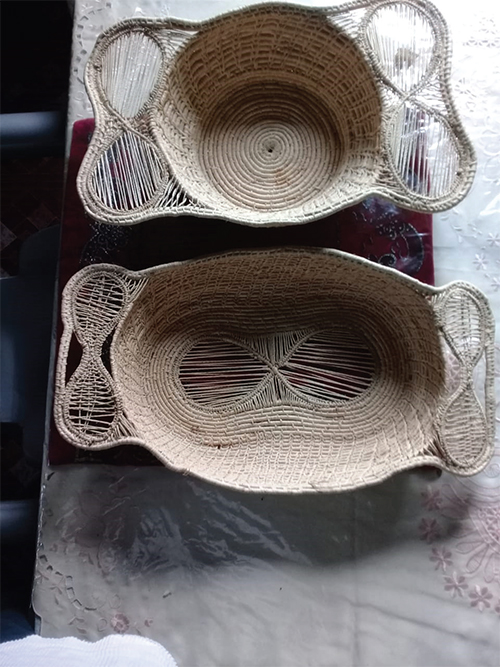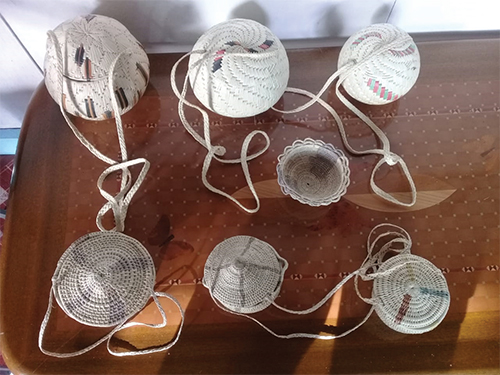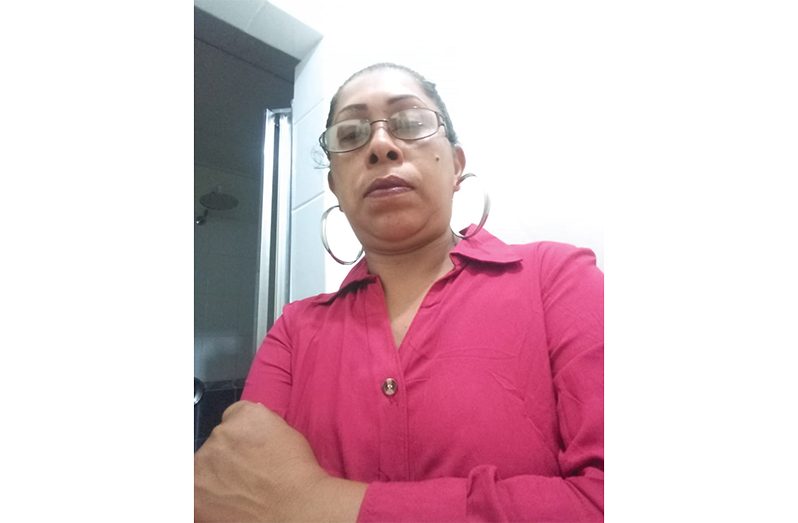Enterprising woman dabbles in multiple areas to support her family
 LESLYN Paul’s grandparents were reportedly the first settlers of Imbotero, Region One (Barima-Waini). It was during the days following indentureship, they left the city to seek a better life.
LESLYN Paul’s grandparents were reportedly the first settlers of Imbotero, Region One (Barima-Waini). It was during the days following indentureship, they left the city to seek a better life.
Paul stated that her fore-parents travelled by paddle boat to Region One and found Imbotero Village, where they settled after discovering that there were lands to be farmed.
She added that they made a living by farming, hunting, fishing and cattle rearing. The Pauls came from India as indentured labourers and they, along with others who had made the journey to Region One, began living in the far-flung community.
Paul reported that most of the early settlers, such as her grandparents, are no longer alive and there are new people in the village these days, Amerindians with a mixture of East Indians and Afro-Guyanese.
As a third generation, Paul told the Pepperpot Magazine that, back then, she only attended nursery and primary schools because her parents could not afford to send them to secondary school in Mabaruma.
The 50-year-old stated that Mabaruma Secondary School has a dormitory today, and students from far-flung communities such as Imbotero have been allowed to stay in and attend classes, which is commendable.
She reported that, in Imbotero Village, there are six part-time teachers, 10 Community Service Officers (CSOs) and five full-time teachers who earn a government salary. Apart from that, there are no other jobs except for the police outpost and a health post.
Paul added that the nursery school’s building is very small and has been there for more than 38 years. As such, classes are held only one day per week, but the primary school is functional and has adequate space.
Paul pointed out that she would sell her handmade tibisiri hammocks at the Imbotero Research Centre when they have guests, and a hammock takes eight days to complete for just $15,000 per hammock.

She explained that acquiring the tibisiri is tedious and time-consuming and she would have to travel via canoe or paddle boat to the freshwater location away from the village into a small creek.
Paul disclosed that it is about three miles paddling to get to the ite’ palm trees and she would extract the branches to start making the tibisiri, including stripping, washing, boiling and drying. It is then spun into something like a polytene cord and then knitted by hand for eight days before completion.
Tibisri is a natural straw-like material harvested from the ete` palm and only grows in fresh water.
According to some, the tibisiri hammock can last a lifetime – at the very least, it can last up to 10 years with proper care. If wet, it must be fully dried to maintain its texture, says Paul.
Apart from hammocks, Paul also makes hats, fruit baskets, bowls, hand bands, necklaces and vases, all handmade from tibisiri.
Paul told the Pepperpot Magazine that making craft is not a fast seller and it is seasonal. As such, she has to bake bread to sell weekly and also buy and sell clothes and plastic utensils to make ends meet financially.

She stated that most people in Imbotero are fisherfolk, and they catch crabs during the crabbing season, which is from August to October annually, but they have come up with other ways to harvest crabs all year.
Paul pointed out that the produce and catch of crabs and fish would be sold at Kumaka Market, which is one hour with a 15-horsepower engine/boat and about 40 minutes with a bigger engine and boat.
She is also a farmer of ground provision but lost her crops due to the current dry season; it has all dried up, and she has a crop of bora, which she is trying to keep alive by watering daily.

“In this part of the country, you have to be multi-talented to do more than one job to earn because of our location, and there aren’t any permanent jobs where you get a salary on a monthly basis so we have to come up with ways, to earn honestly,” she explained.
Paul added that life is not ‘a bed of roses’ in Imbotero but it is home and she is determined to do whatever it takes to continue living there.
Paul reported that life is slow in the border location, and the cell phone service is unstable. For her to get a good signal, she has to paddle for five minutes to get to the health outpost to make a call, receive calls, or use her personal data on her phone.
“The remote village life is not for everyone. I am from here, born and raised, so that’s how I survive, but relocating isn’t part of my plan. Although I would like to have one permanent job to offset living expenses,” Paul reasoned.




.png)









